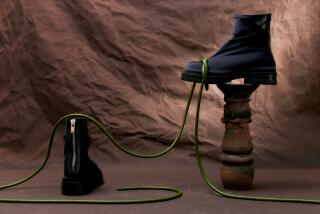Rich Rewards : Amir Will ‘Do Anything’ to Lure Big Spenders, Preferably Royalty, to His Beverly Hills Shop
- Share via
Tucked away in the basement-level shopping arcade of the Beverly Hills Hotel is Amir, a tiny men’s store whose motto is “understated elegance.”
Maybe, but don’t confuse understated with underpriced. At this store, owned by a single-named, 35-year-old, Iranian-born former fashion model, private-label tuxedos start at $2,600, leather jackets at $4,500. And a vicuna sports jacket sells for $40,000--a price tag sure to make some customers reconsider before reaching for their Platinum Card.
“But, sir, feel this, it’s as good as sex,” Amir recalls saying to a gray-haired client one day.
“Son, at my age, this is sex,” the businessman replied. Then he bought the jacket.
It’s hard to believe amid a faltering economy, but this luxury men’s store of only 1,100 square feet--the size of some Beverly Hills bathrooms--claims to be having one of its best years ever, with projected sales of $12 million.
The reason seems to be a small but largely recession-proof clientele consisting of what Amir describes as mostly international “royalty.” Among them he names the sultan of Brunei, the king of Malaysia, Hollywood stars and business tycoons.
“I’m not for everybody,” he says. “I design for one-tenth of a percentage of the market.”
Just five years ago, Amir recalls, he had a small showroom in a small, sleepy shopping center off Mulholland Drive in Bel-Air. And although clients such as Cary Grant would stop by for cashmere socks in every color, rumors were rampant that Amir’s business was going bust, he says.
Then, he got an idea.
Believing that “sometimes it’s not a question of people knocking on your door, sometimes you have to go after them,” he made his move after hearing that relatives of one of the world’s richest and most private royal leaders--the sultan of Brunei, Muda Hassanal Bolkiah--were planning a visit to Beverly Hills.
“I knew his wife loves pink. So I made up a huge basket covered in pale pink satin filled with 10 dozen pink tulips from Holland, and inside was a note that said, ‘Your Majesty, I would like to welcome you to Beverly Hills.’ ”
Immediately, Amir received a call from the family’s chief of staff informing him that the sultan’s brother would stop by. With a butler in tow and Dom Perignon on ice, Amir waited.
And waited. And waited. “I thought, ‘Holy mackerel. Either they’ve been kidnaped or they changed their minds.’ I was very disappointed that they hadn’t been courteous enough to call.” He later found out that the family had stood him up to visit the set of “Dallas.”
But the next day, without warning, an army of black limousines pulled up to Amir’s door, and about 40 people from the royal entourage spilled into the store. “I was really, really nervous,” Amir admits. “But then his majesty put on one of my suit jackets, a Size 38 regular, and it fit him like a glove.”
After a shopping spree of only 90 minutes, the royal family had wracked up sales of $190,000--paid in cash by two men whose job it was to carry a suitcase filled with $100 bills.
“It was more money than I’d ever seen all in one place,” Amir says.
The visit was the start of a lucrative relationship for Amir; when the sultan purchased the Beverly Hills Hotel in 1987, Amir relocated his shop there.
For the sultan and other good customers, he will “do anything”--including produce and deliver, on 24 hours’ notice, eight handmade, $4,500 leather jackets in eight different colors, as he recently did for the king of Malaysia, Azlan Muhibuddin Shah. Amir added a special satin lining decorated with the king’s crest, he says.
When one good customer asked him to invent “the ultimate gift” for Prince Charles, Amir designed a six-piece set of crocodile luggage, lined with yellow satin and decorated with the royal family’s coat of arms, for $125,000.
“They’re rich for a reason,” he says of such big-spender clients. “It’s because they’re smart and they’re demanding. They don’t buy because they have money, they buy because it’s the best.”
What Amir defines as the best is a look he calls “exciting conservative.” But some contend that his greatest talent is as a copycat. As an Iranian-born Beverly Hills designer-retailer who caters to the rich, a comparison to that other Iranian-born Beverly Hills designer-retailer who caters to the rich--Bijan--is inevitable. Mention the “B” word to Amir, and he bristles.
“I’ve never met Bijan,” Amir says.
Maybe not, but thanks to heavy advertising and self-promotion, not to mention his face on billboards, competitor Bijan’s is a household name. The question is whether Amir, who has already imitated Bijan’s billboard ads as well as his classic-conservative styling, will become one, too.






